The Architects of Online Retail
E-commerce developers are the specialized architects behind today’s online stores. As the web development market grows towards a projected $130.9 billion by 2032, these experts are essential for any business selling online. They build and maintain digital storefronts by creating custom designs, integrating platforms like Shopify, setting up secure payment gateways, optimizing for speed and mobile use, and providing ongoing support.
In a market with over 27.2 million online stores, a professional presence is non-negotiable. Research shows 75% of consumers judge a business’s credibility by its website, and 92% feel more confident when a site runs smoothly. With mobile sales expected to comprise nearly 50% of US e-commerce by 2027, a mobile-first approach is critical. A great e-commerce site doesn’t just function; it converts visitors and builds brand loyalty.
About the Author: I’m Cesar A Beltran, Founder and CEO of Blackbelt Commerce. With over 15 years of experience and 1,000+ projects launched, I’ve seen how skilled e-commerce developers are the key to digital success.
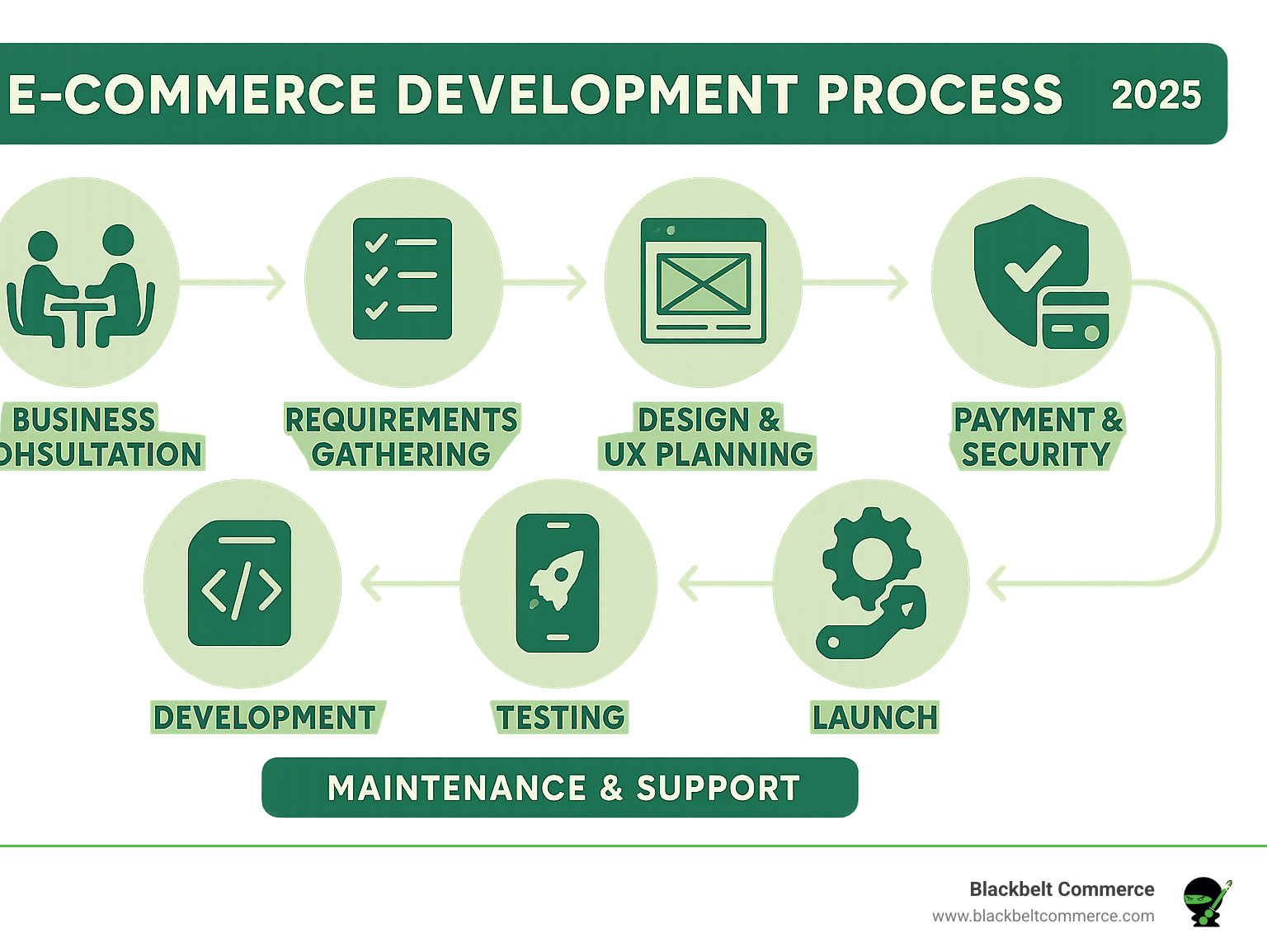
E-commerce developers definitions:
- ecommerce development companies
- ecommerce development companies new york
- ecommerce web development company in new york
What is an E-commerce Developer and What Do They Do?
An e-commerce developer is a specialist who builds the entire online shopping experience, turning browsers into buyers. Unlike general web developers, they focus exclusively on the technical and business complexities of online retail, from user psychology to secure payment processing. They blend technical skill with business acumen, collaborating with designers, marketers, and owners to align every decision with revenue goals.
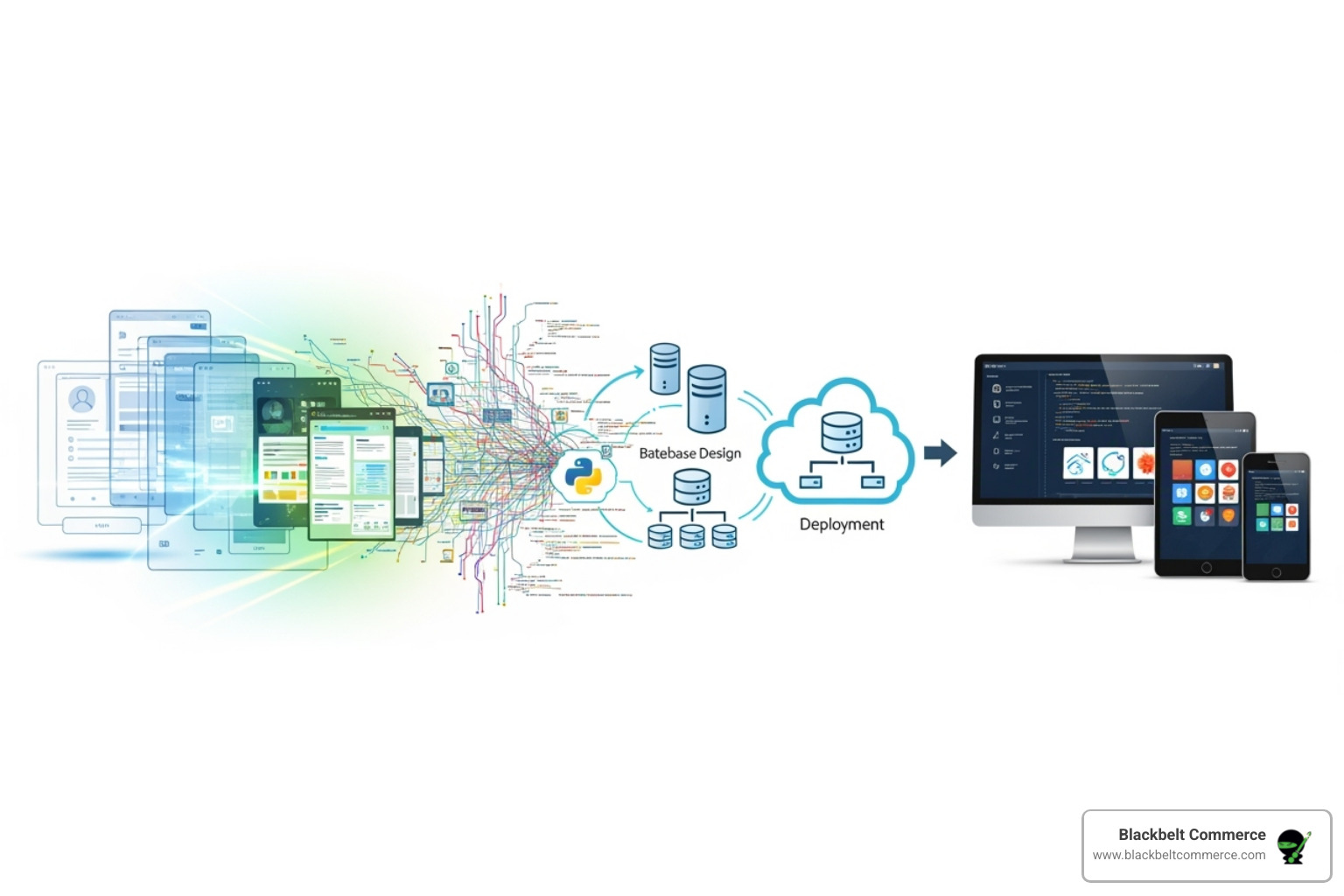
Explore our expert Shopify Development Services.
Key Duties and Responsibilities
The work of an e-commerce developer is diverse and critical to a store’s success:
- Website Architecture: They design the store’s entire structure, including intuitive navigation, product catalogs, and a seamless shopping cart and checkout process.
- Platform Customization: Using platforms like Shopify, they create custom themes and add specialized features that reflect a brand’s unique identity and provide a competitive edge.
- Payment Gateway Integration: Developers integrate secure payment options like Shopify Payments and PayPal, a crucial feature since 90% of shoppers value multiple payment choices.
- Product & Inventory Management: They build robust systems to track stock levels in real-time, preventing overselling and ensuring product information is always accurate.
- Security & Performance Optimization: They act as digital bodyguards, implementing SSL certificates, securing customer data, and optimizing site speed. A smooth-running site builds trust, which translates directly to sales.
- Ongoing Maintenance & Support: Top developers provide regular updates, monitor performance, and fix bugs quickly, ensuring the store adapts and grows with the business.
The Different Types of E-commerce Developers
E-commerce development includes several distinct specialties:
- Front-End Developers: These developers use HTML, CSS, JavaScript, and Shopify’s Liquid to turn designs into responsive, interactive web pages that customers see and use.
- Back-End Developers: Working behind the scenes, they manage databases, server logic, and API integrations that power the store’s functionality, connecting it to payment and shipping systems.
- Full-Stack Developers: These versatile developers handle both front-end and back-end tasks, making them valuable for projects requiring seamless coordination.
- Platform Specialists: These experts, like our Shopify specialists, have deep knowledge of a specific platform, allowing them to build sophisticated solutions more efficiently.
- Mobile E-commerce Developers: With mobile sales approaching 50% of US e-commerce by 2027, these developers focus on creating flawless mobile shopping experiences, either through responsive design or dedicated apps.
The Essential Toolkit: Skills and Technologies
A successful online store requires a mastery of specific tools. E-commerce developers use a modern toolkit of languages, platforms, and frameworks to build stores that are not only functional but also profitable.
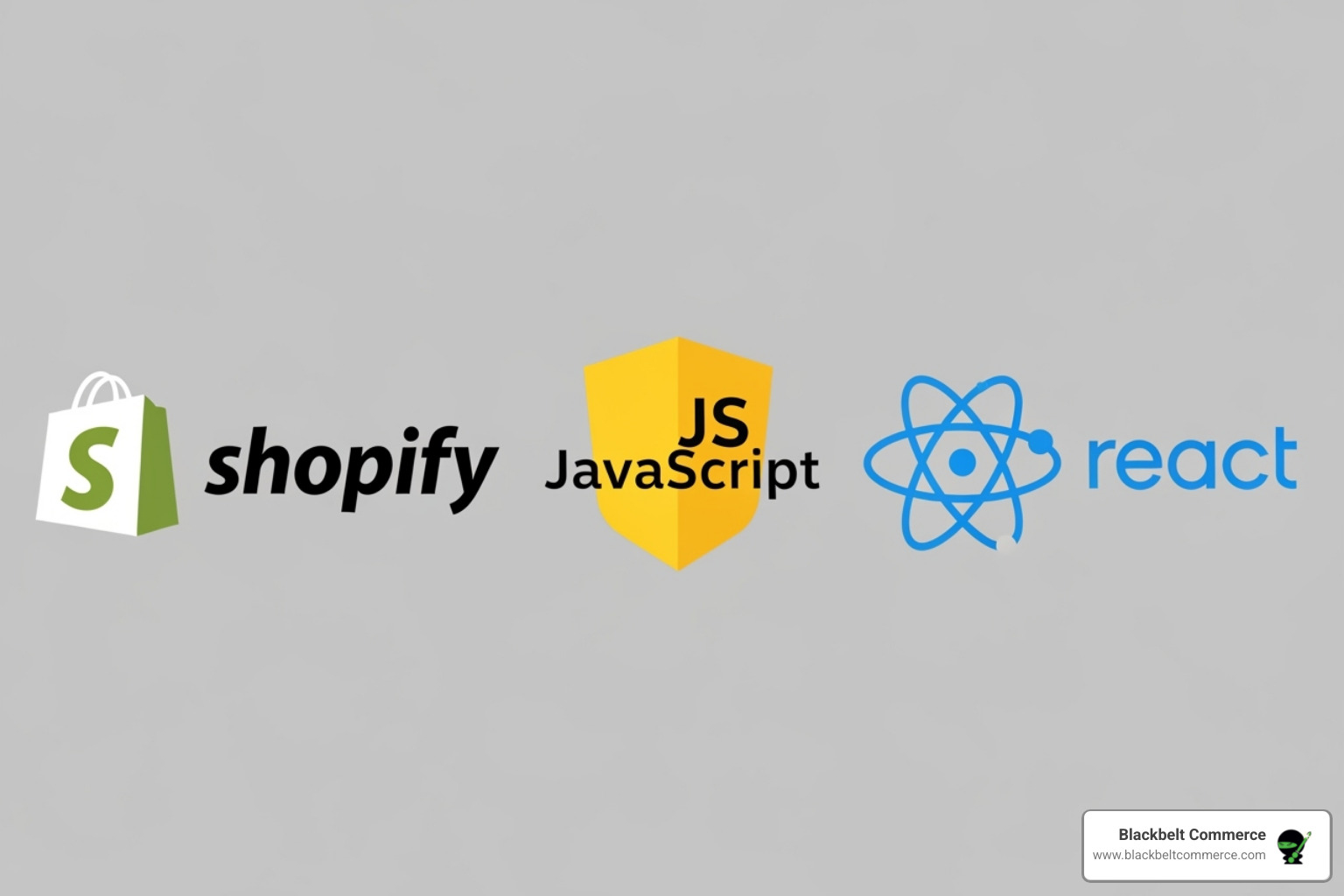
Core Programming and Web Languages
- HTML & CSS: These are the fundamental building blocks. HTML provides the structure of a webpage, while CSS adds the visual styling, from colors and fonts to responsive layouts.
- JavaScript: This language brings interactivity to a store, powering features like image galleries and real-time updates. Modern frameworks like React.js and Vue.js help build fast, dynamic user interfaces.
- Liquid: Shopify’s own templating language is essential for Shopify developers. It allows them to create dynamic themes that pull data directly from the store’s backend.
Leading E-commerce Platforms and Architectures
Most businesses build on established platforms. Shopify is a leader due to its user-friendliness, robust features, and scalability, with Shopify Plus offering advanced capabilities for high-volume merchants. The real power is open uped through Custom Shopify Solutions, where developers build bespoke apps and themes.
A cutting-edge approach is Headless Commerce with Shopify, which decouples the front-end from the back-end. This gives developers total creative freedom to build ultra-fast, unique user experiences while still using Shopify’s powerful commerce engine. This aligns with modern MACH architectures (Microservices, API-first, Cloud-native, Headless), which prioritize flexibility and future-readiness.
Critical Supporting Technologies for E-commerce Developers
- Databases: Systems like MySQL and PostgreSQL store all product, customer, and order data, requiring skilled management to ensure smooth operation.
- APIs: These interfaces connect the store to essential third-party services, including payment gateways like Shopify Payments and PayPal, shipping carriers, and marketing tools.
- Version Control: Tools like Git are crucial for professional development, allowing teams to track code changes, collaborate safely, and prevent errors.
- Security Protocols: Implementing SSL certificates and adhering to PCI Compliance standards is non-negotiable for protecting customer data and building trust.
Why Hiring Professional E-commerce Developers is a Game-Changer
In a crowded digital marketplace, investing in professional e-commerce developers is what separates struggling stores from successful ones. It’s an investment in a digital experience that builds trust, drives sales, and enables sustainable growth.
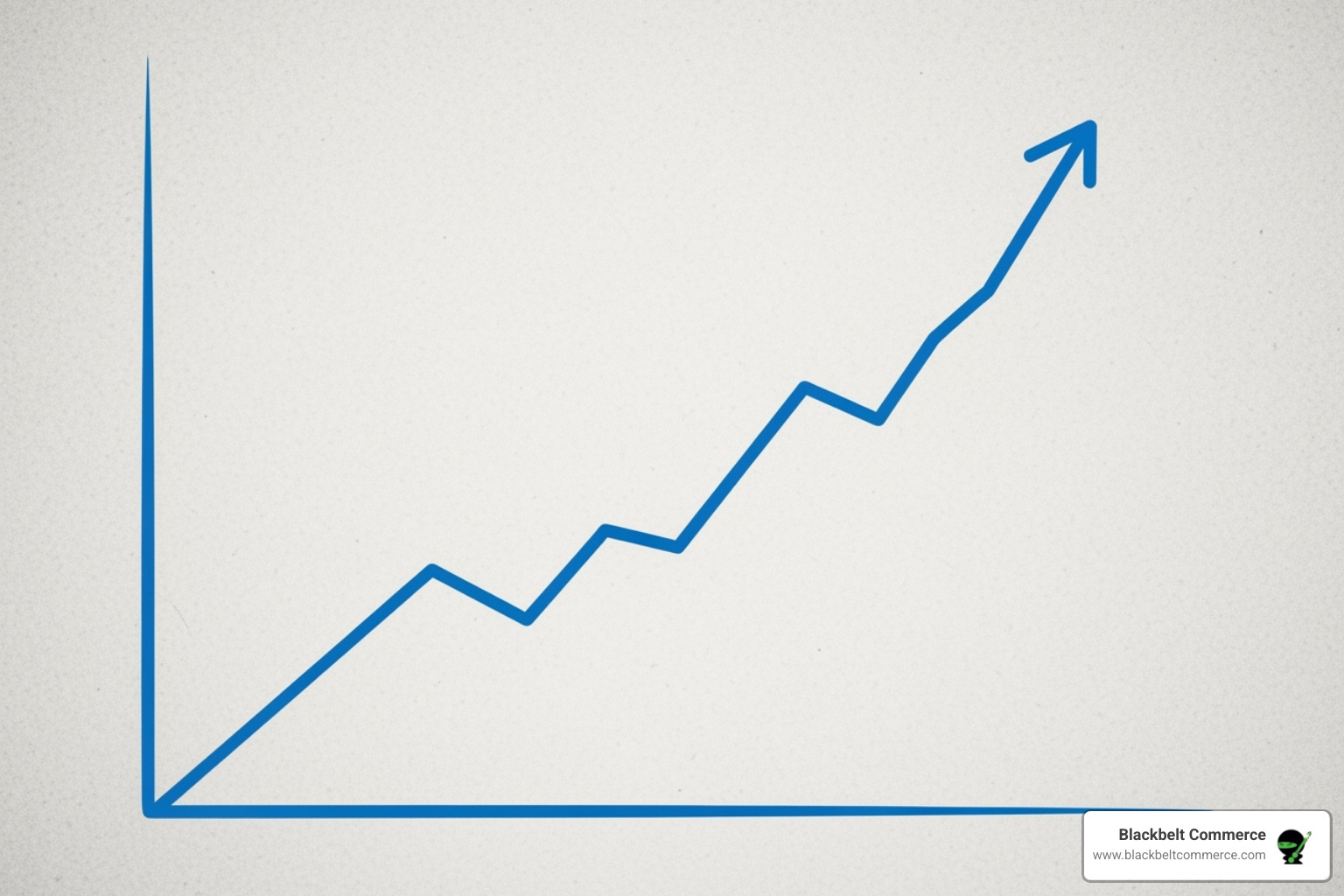
Professional development directly impacts your bottom line. Since 75% of consumers judge a business by its website design, a polished and smooth-running site is critical for credibility. This confidence translates into higher conversion rates and repeat business.
Key advantages of hiring professionals include:
- Customization: Developers create bespoke experiences that differentiate your brand from the 27.2 million other online stores, building features that solve your specific business challenges.
- Security: They implement robust security measures, including SSL and PCI compliance, to protect sensitive customer data and safeguard your reputation.
- Scalability: Professionals architect sites that can handle growth, ensuring that a surge in traffic during a sales event won’t crash your operation.
- Mobile-First Design: With mobile commerce growing rapidly, developers ensure your site delivers a flawless experience on all devices, capturing a crucial segment of the market.
In today’s competitive environment, professional development isn’t a luxury; it’s a necessity for success.
Learn how to choose the right Shopify developer for your project.
How to Hire the Right E-commerce Development Partner
Choosing the right e-commerce development partner is a critical business decision. Whether you’re looking for talent in a tech hub like New York City or considering a remote team, a strategic approach is essential to finding a partner who understands your vision and can deliver results.
Step 1: Define Your Project Goals and Scope
Before you begin your search, get clear on your objectives. A well-defined scope is the foundation for a successful project.
- Business Objectives: What is the primary goal? Are you launching a new brand, increasing conversion rates, or expanding into new markets?
- Target Audience: Who are your customers? Understanding their online behavior and preferences will shape every design and functionality decision.
- Required Features: List all necessary functionalities, such as subscription services, custom product configurators, or specific integrations. Consider both current and future needs.
- Budget and Timeline: Establish a realistic budget and timeline. This helps you get accurate proposals and sets clear expectations from the start.
Step 2: Evaluating Potential E-commerce Developers
With your goals defined, you can start evaluating potential partners.
- Portfolio and Case Studies: Review their past work, looking for projects similar to yours in scope or industry. Check for functionality, speed, and user experience.
- Client Testimonials: Look for consistent positive feedback on sources like Google Reviews or Clutch. Pay attention to comments on communication, deadlines, and problem-solving.
- Technical Expertise: Ensure they have deep knowledge of your chosen platform (e.g., Shopify’s Liquid and APIs). They should be able to explain complex topics in simple terms.
- Platform Specialization: A developer who specializes in a platform like Shopify, such as a Shopify Plus partner, will often deliver better results faster than a generalist.
- Communication: Assess their communication style during initial talks. Prompt, professional responses and thoughtful questions are signs of a good partner.
Step 3: Choosing Your Model: Freelancer vs. Agency in New York
The choice between a freelancer and an agency depends on your project’s complexity, budget, and support needs. Both are viable options in the competitive New York market.
| Factor | Freelancer (NYC Market) | Agency (NYC Market) |
|---|---|---|
| Cost | Often lower hourly rates ($50-$200+/hour), but total cost can vary. | Higher upfront investment ($5,000-$250,000+), but often includes comprehensive services. Learn more about Shopify expert costs. |
| Scalability | Limited by one person’s bandwidth. | Full teams can scale to meet project needs. |
| Breadth of Expertise | Usually specialized in one or two areas. | Comprehensive teams with designers, developers, SEO experts, and project managers. |
| Project Management | Requires more hands-on management from you. | Dedicated project managers and established processes. |
Freelancers are great for smaller, well-defined tasks. Agencies excel at complex, large-scale projects that require a comprehensive team, ongoing support, and clear accountability. For businesses seeking a single partner to handle all aspects of a challenging project, an agency often provides the best long-term value.
The Future of E-commerce Development
The world of e-commerce is constantly evolving, and developers are at the forefront, shaping the future of online retail. The role is shifting from simply building websites to architecting adaptive digital ecosystems that create seamless, personalized shopping journeys.
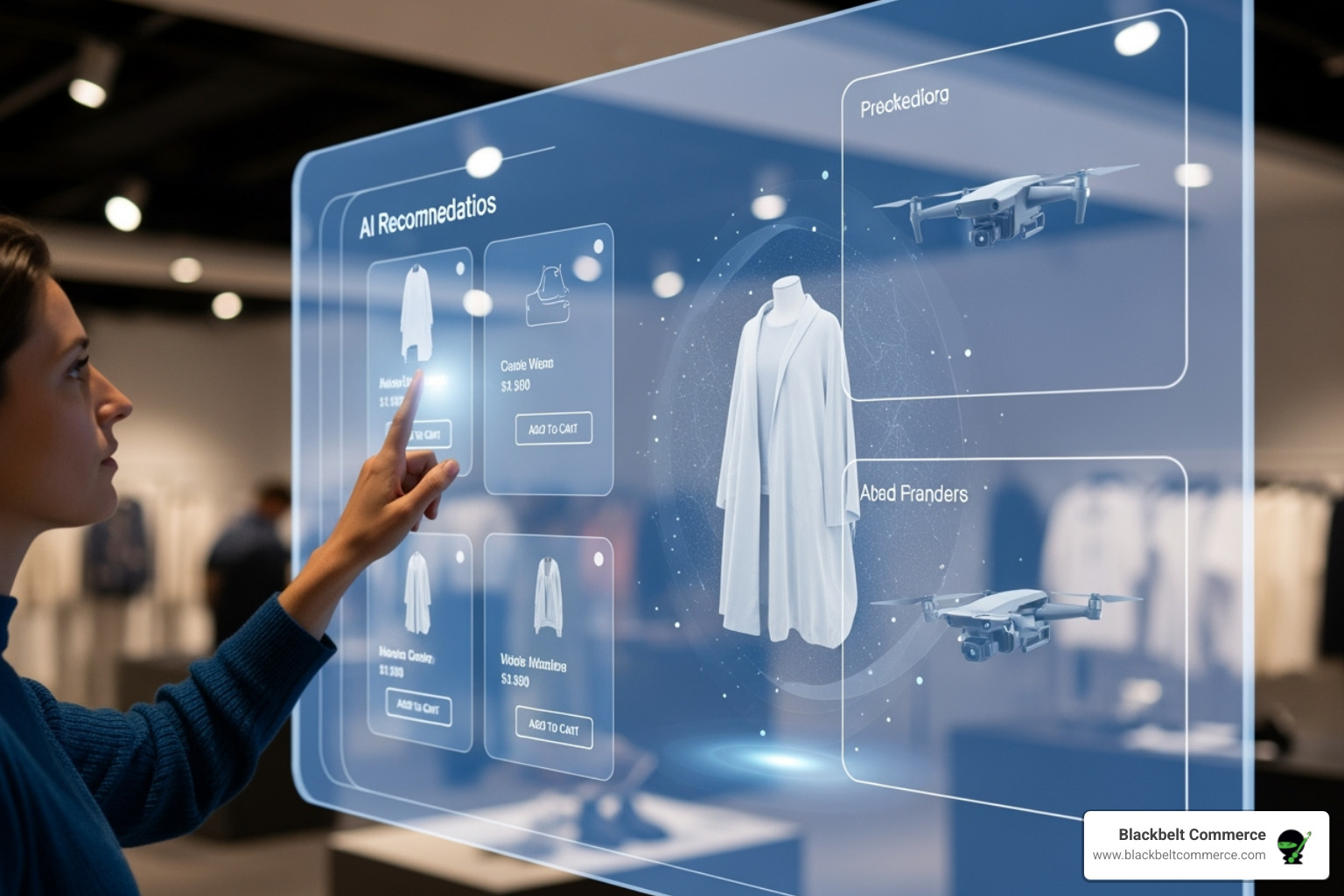
Headless & Composable Commerce with Shopify
Headless commerce separates the customer-facing storefront from the back-end operations. This gives e-commerce developers the freedom to build lightning-fast, highly customized experiences using any front-end technology, while still relying on Shopify’s powerful infrastructure. Composable commerce takes this further, allowing businesses to assemble a “best-of-breed” tech stack by plugging in specialized services for functions like search or payments, creating a highly agile and future-proof system.
AI-driven Personalization
Artificial intelligence is enabling hyper-personalized shopping. E-commerce developers are integrating AI to analyze customer data and deliver curated experiences, from predictive product recommendations to intelligent chatbots. This technology, once exclusive to retail giants, is now becoming more accessible, allowing businesses of all sizes to increase engagement and sales.
Augmented Reality (AR) Shopping Experiences
AR is bridging the gap between online and in-store shopping. Developers are creating experiences that let customers virtually “try on” products, from sunglasses to furniture in their living room. This boosts buyer confidence and helps reduce return rates by giving a better sense of size, fit, and style before purchase.
Voice Commerce
As voice assistants become more common, shopping via spoken commands is on the rise. E-commerce developers are optimizing stores for voice search and creating conversational purchasing flows, a trend that requires a new approach to interface design and security.
The Importance of Continuous Learning
In this field, the most critical skill for an e-commerce developer is the ability to continuously learn and adapt. The technologies that are standard today may be outdated tomorrow. Successful developers are lifelong learners, always ready to experiment with new tools to solve the next generation of retail challenges.
Frequently Asked Questions about E-commerce Developers
When building or improving an online store, many questions arise about working with e-commerce developers. Based on our experience with over 1,000 projects, here are the answers to the most common ones.
How much does it cost to hire an e-commerce developer?
Costs vary based on the project’s scope, the developer’s experience, and the hiring model.
- Freelancers: Rates typically range from $50 to over $200 per hour. A developer in a major US market like New York will generally cost more.
- Agencies: Projects are quoted based on scope. A straightforward site might start around $5,000, while complex, custom builds can range from $50,000 to $250,000+. Most US projects fall between $15,000 and $49,000.
- In-House: A salaried developer can cost $45,000 to $111,000 annually, plus benefits and overhead.
This investment covers not just coding, but also expertise in security, conversion optimization, and project management. Find out how much it costs to hire a Shopify expert.
What’s the difference between a web developer and an e-commerce developer?
While every e-commerce developer is a web developer, the reverse is not true. A general web developer builds various types of sites. An e-commerce developer specializes in the unique challenges of online sales.
Their expertise includes transaction security (PCI compliance), payment gateway APIs (like Shopify Payments and PayPal), complex inventory management logic, and deep knowledge of specific e-commerce platforms like Shopify. They think in terms of conversion rates and sales funnels, not just design. It’s the difference between a general contractor and a specialized electrician.
Do I need a developer if I use a platform like Shopify?
Shopify makes it easy to launch a basic store, but “functional” is not the same as “successful.” To truly compete and grow, a professional developer is essential. You need a developer to:
- Create a unique brand experience that stands out from millions of other stores.
- Implement custom features not available in standard themes or apps.
- Integrate with other business systems like your CRM or ERP.
- Optimize for performance to improve load speed, SEO, and conversion rates.
- Ensure advanced security and build a site that can scale with your business.
While a DIY approach might work for a simple startup, professional e-commerce developers are a key investment for serious businesses. Our Shopify Experts Agency can open up your store’s full potential.
Conclusion: Your Partner in Digital Growth
E-commerce developers do more than build websites—they architect the digital backbone of your business. The quality of their work directly impacts your credibility, customer experience, and bottom line. Your online store is your 24/7 salesperson, and its performance depends on the expertise behind its construction.
At Blackbelt Commerce, we have spent over 15 years perfecting the art and science of Shopify development. We don’t use cookie-cutter templates; we create fully customized, conversion-focused Shopify solutions that reflect your unique brand and drive measurable results. Our team understands both the technical and business sides of e-commerce, focusing on performance, user experience, and scalability.
The e-commerce landscape will continue to evolve, but with the right development partner, change becomes an opportunity. We’re not just here to build your store; we’re here to be your long-term partner in growth, adapting and innovating as your business succeeds.
Your digital success story starts with the right team. We’d love to be part of that journey.
Ready to build a high-converting online store? Contact our e-commerce experts today!

